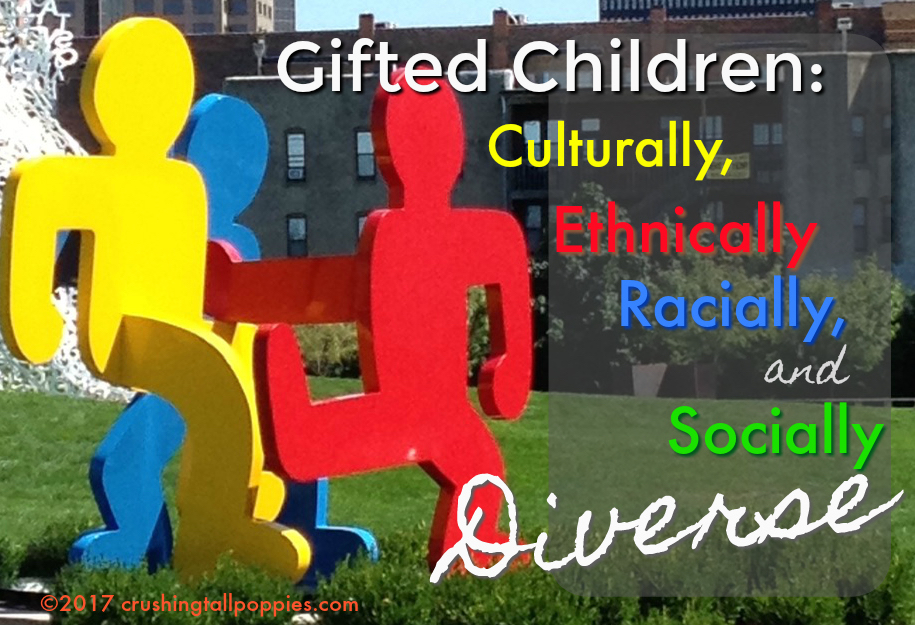Gifted Children: Culturally, Ethnically, Racially and Socially Diverse

In A Gifted Child Checklist for Teachers, I listed ten basic characteristics and traits of gifted children intended to help teachers and others identify giftedness in all children by providing a list of gifted traits and characteristics, some of which aren’t always so well-known, easily recognized or widely understood. I was my intent that my checklist would dispel some myths and correct some incorrect information about giftedness.
#7 on my list was the fact that gifted children are a culturally, racially, socially and ethnically diverse group of students (This is an updated version of that post. See the original post for #7 here). That giftedness is diverse, occurring within all groups of people, is often not recognized or put into practice when identifying gifted children. Too many students from families of a lower socioeconomic status, as well as students from culturally, ethnically and racially diverse groups are often disregarded for gifted identification likely because of beliefs in unfortunate myths and a prevalence of incorrect information about what giftedness is and what giftedness can look like in the classroom.
Here are a few myths which likely contribute to many gifted children from diverse backgrounds being overlooked, misidentified and miseducated. Below each myth, I’ve provided facts and truths widely held among the gifted community as a result of research studies, years of data, statistics and anecdotal evidence.
MYTH 1: Giftedness – It’s made, not inborn.
The belief here is that giftedness is a trait that can be gained through practice, effort, hot-housing, tutoring and other forms of extra educational enrichment and effort. One does not have to be born gifted; you can work to become gifted and be accepted into gifted education programs. The talent development community most often is associated with this belief.
TRUTH 1: Giftedness – It’s inborn, not made.
Gifted people are born this way, at least that is the most widely held belief among the gifted community. The vast majority accept that giftedness is inherited from one’s parents who are likely gifted themselves. So the belief that one can gain, earn or groom giftedness is considered untrue. Giftedness is a trait, a genetic characteristic that is present at conception and spans a gifted individual’s life span. No one can really make themselves gifted.
MYTH 2: Gifted students come only from specific races, and from middle- and upper-class families.
The belief here is since giftedness is made, not inborn, a higher-than-average socioeconomic status or specific cultures provide a family the determination, education and means to provide all the resources needed to nurture their child into giftedness, and into the gifted program at school. Families of a lower socioeconomic status, and students from some cultural, racial, and ethnic groups are believed to not have the determination, means or education to provide these resources to their children in order to enrich and grow their child’s intelligence, and therefore are unlikely to have gifted individuals within that group.
TRUTH 2: Gifted students come from all walks of life.
Gifted children are represented in every cultural, ethnic, racial and socioeconomic group because giftedness does not discriminate.
The Big Truth
Giftedness is inherently diverse. There is already so much societal bias against giftedness, but giftedness has no inherent bias—we must recognize this. Intellectual giftedness does not discriminate socially, racially, culturally, ethnically or socioeconomically.
Of all the myths and false information that impedes a true understanding of giftedness in children, the myth that giftedness is inherent among only certain cultures, races, ethnicities, and socioeconomic statuses is, without a doubt, the most detrimental and discriminatory; and it does a tremendous disservice to the children who are never identified. Also, the child and society as a whole suffer when these gifted children are miseducated and hindered from fulfilling their potential.
Holding onto the fallacy that a gifted child is the child of privilege—one from specific races, cultures and a middle- and upper-class family impedes identification, and the much-needed educational nurturing of giftedness in a child does not take place. To me, this is morally wrong, hurtful, and shameful. The underrepresentation of gifted children from overlooked cultures, races, ethnicities and socioeconomic statuses, and the subsequent miseducation of these unidentified gifted children is a significant social and educational issue which needs to be addressed.
Those of us who have gifted children know there are many inadequacies in public gifted education, and many of our gifted children are educationally neglected. But, the neglect for these unidentified gifted children from disregarded cultures, races, ethnicities and socioeconomic statuses is painfully multiplied.
Teachers should be knowledgeable of all gifted characteristics and be able to recognize these traits in all gifted children, despite their familial backgrounds. When gifted students’ unique learning needs go unmet, underachievement, delinquent behavior, depression, suicide and dropping out of school can occur. We cannot let unidentified gifted children just fall through the cracks nor ignore their right to an appropriate education which they need to fulfill their potential.
There is so much to be said on this topic that I couldn’t possibly do it the justice it deserves in one post, so I’ve gathered what I think is a representative list of resources which touch on the many aspects of the racial, cultural, ethnic and socioeconomic diversity of giftedness. We all need to do our part to advocate for gifted children who are underrepresented and work to make sure they are identified. We can no longer morally or ethically stand by and allow this educational neglect to continue. These are our children, and our future and their futures are at stake.
ARTICLES, BLOGS AND RESOURCES ON GIFTED DIVERSITY
NZ Ministry of Education: Cultural Considerations
NZ Research on Maori Identification of Giftedness: (2013) An Investigation into the Identification of Māori Gifted and Talented Students in Mainstream Schools
Gifted Homeschoolers Forum: Gifted Cubed-The Expanded Complexity of Race & Culture in Gifted and 2e Kids
Hoagies’ Gifted Education Page: Gifted Students at Risk (resource page)
We Are Gifted 2: A website dedicated to advocating for underrepresented minorities in gifted education.
Scientific American: Where Are the Gifted Minorities?
Davidson Institute: Gifted programming for poor or minority urban students: Issues and lessons learned
Association for Supervision and Curriculum Development: Poor and Minority Students Can Be Gifted, Too!
This post is part of the New Zealand Centre for Gifted Education Gifted Awareness Blog Tour, June 1 – 30, coinciding with New Zealand’s Gifted Awareness Week, this year June 12 – 18, 2017. Click the image below for more information and to see more on the blog tour!
 Crushing Tall Poppies
Crushing Tall Poppies





If giftedness is genetic why is it spread so evenly through the population? As I understand it genetic traits tend to cluster in certain demographics while giftedness remains belligerently egalitarian.
Are gifted children ever born to families with no previous history of giftedness? What are the results of trying to artificially create giftedness?
The other explanation of giftedness (other than ‘punishment from a vengeful god’) is indigo children. It’s basically the entire concept of gifted re-branded as a spiritual mission. Apparently it comes in generations – indigo children break down old systems, rainbow children clear away the rubble and crystal children build the new world. I was born in 1980 so that makes me indigo – the spiritual battering ram. On reflection…this would explain a lot. 😉
Correction – crystal comes before rainbow.
Sorry for not replying–we were on holiday. And somehow there was a one symbol “/” reply. I have no clue how that happened. Seriously weird.
Anyway…
I think: the number of gifted people is an estimate and given that many gifted people go through life unidentified, many in the field feel the number is higher. So, the statistics may not be telling the entire story. That it’s egalitarian is probably similar to some inherent traits which don’t cluster in certain demographics–sexual orientation, some physical birth defects. Also, giftedness is likely more prevalent, for whatever reason, in certain demographics. Is it because that particular ethnicity is “blessed” to have a higher prevalence of giftedness, or is it because of a stronger awareness and thus better identification? One thing is for sure, there are races, cultures and ethnicities which are too often assumed to not have gifted individuals within their group; this is just wrong.
I’ve heard of indigo children and there could be something to that concept although I have not looked into it in depth and can’t comment on that.
I really like your questions about the prevalence of giftedness in society. It makes one truly ponder about giftedness. I’m sure there are professionals in the field of human intelligence who have studied this and continue to study the prevalence of giftedness.
Thanks, DY!
One theory I heard is that there is a small hump on the extreme right of the bell curve so there are substantially more very intelligent people than a normal distribution would suggest.
I could see history altering the distribution of giftedness. Some people think Russian women are different not just because of culture or the legacy of communism, but because three quarters of the victims of Russian witch hunts were men. So the most capable Russian women weren’t slaughtered like they were elsewhere in the early modern era. Being born gifted and black during slavery was probably a first-class ticket to either killing yourself out of spite or dying while leading a slave uprising. When the Nazis occupied Poland they carried out the Intelligenzaktion, an operation to kill every intellectual in Poland.
I am interested in spirituality but don’t really believe in indigo children, partly because I’m not a fan of prophetic metaplots where humanity is just the plaything of cosmic forces, and because it ascribes common gifted traits just to children born in the 70s and 80s. The successor crystal and rainbow children don’t have these traits. Have you noticed gifted children born in the 90s or later being anymore laid-back and tolerant of unjust authority? In some ways the concept lets you swell your chest with pride, in other ways it is amusing, but I also think it is has more serious consequences. It could make giftedness more acceptable in hippy and new age circles but could could discredit it in skeptical or traditionally religious circles.
Very interesting points! Thank you for always giving us something to think about!